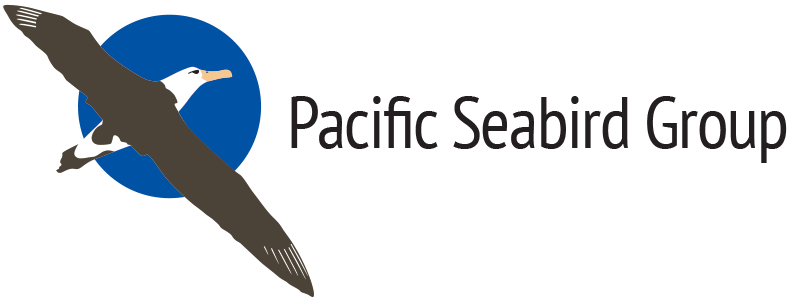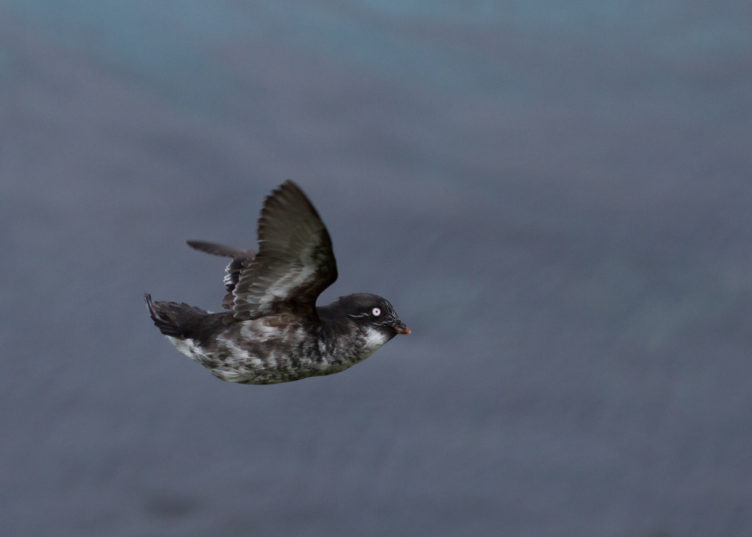Notes from the 51st Annual Meeting of the Pacific Seabird Group (PSG 2024)
Written by Juliet Lamb
A hawk swoops through a ballroom, grazing the tops of our heads. Whales surface against the craggy coastline of Puget Sound. Welcome to the 51st Annual Meeting of the Pacific Seabird Group, where for a few days anything was possible.
I could sum up the meeting in statistics—110 oral presentations, 35 posters, 289 attendees from at least 15 countries. However, the real story of this meeting wasn’t in the numbers, but the connections we made with one another. I witnessed these first-hand during post-presentation chats with colleagues to forge new collaborations, lively career discussions at the student-mentor session, and meetings and symposia that harnessed our collective wisdom to curtail the catastrophic effects of avian influenza, combat climate change through seabird-sensitive offshore wind energy development, or understand and protect threatened seabird taxa throughout the region and beyond.
The meeting started off on a high note at Flatstick Pub, where the local committee treated us to food, drinks, and mini golf, and nobody wanted to go back to their hotels at the end of the night. Later, in a memorable evening storytelling session, PSGers shared epic tales of owl stalking, robot colleagues, trying and failing to find a good bathroom spot in the field, and the extreme measures they’re willing to take to protect seabirds from feral cats (I’d say more, but we’ve been sworn to secrecy). Rounding out the meeting were visits to some of Seattle’s best seabird-related attractions: a behind-the-scenes look at the Burke Museum’s bird collection, a trip to the Seattle Aquarium, and a bird- and whale-watching boat tour.
Anchoring the incredibly rich scientific program were our plenary speakers, whose talks offered an optimistic and proactive outlook for the future. Sarah Converse provided practical examples of how decision science can make seabird conservation more effective, efficient, and inclusive. Natalie Ban and Jaime Ojeda presented a vision for seabird science that includes local communities as equal partners. Gemma Clucas took us with her on a National Geographic-worthy adventure to study penguins on wild, unforgiving Zavadovski Island. And Steve Kress, this year’s Lifetime Achievement Award winner, showed us how translocation and restoration efforts have transformed (and continue to transform) seabird conservation in a changing world. I was especially moved by the words of Special Achievement Award winner Linda Elliott, who highlighted the essential and often neglected importance of wildlife rehabilitators in seabird conservation. Together, their talks made me feel more confident than I’ve felt in a long time about our power as individuals to make a real difference for seabirds, despite all the challenges stacked against us.
At the same time, our meeting offered a chance to look inward and seek opportunities to make both PSG and seabird science more inclusive. Thanks to the Local Committee’s energy in securing funding, the success of prior silent auctions, and the generosity of donors, we were able to award over $20,000 toward meeting travel expenses for students and international scientists. This year’s brand-new gear swap (organized by early-career PSGer Kristina McOmber) gave early-career scientists a chance to take home high-end used field gear donated by members. The EID committee organized and secured funding for a workshop to improve equity in hiring practices. A new photo exhibit, Faces of Seabird Conservation, showcased the diversity of backgrounds and experiences within our community by profiling seabird scientists, conservationists, volunteers, and enthusiasts throughout the world. We still have a long way to go before PSG truly encompasses the breadth and depth of human experience in seabird conservation, but I am buoyed by our collective enthusiasm and energy for doing this important work.
I want to end with an enormous thanks to everyone who made this meeting such a memorable experience. To the local committee and our fearless conference planner, Justine, for welcoming us to Seattle and managing the complex logistics. To the symposium and workshop organizers, session chairs, and AV volunteers who donated their time and energy to keeping everything running smoothly. To the students whose fresh ideas, enthusiasm, and high-caliber research contributed contagious energy and forward-thinking optimism. To the seasoned professionals whose wisdom, patience, and kindness made them approachable despite their intimidating accomplishments. And finally, to everyone who contributed to discussions on the important issues facing our organization. You are the future of PSG, and I am beyond excited to be part of it.







